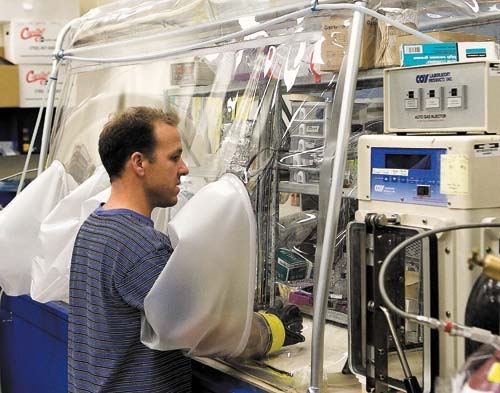Researcher sees fuel from biowaste
Remember that scene in "Back to the Future" where the white-haired scientist guy plops a bunch of food scraps into his time machine car to use as fuel and, whoosh, it goes flying off into the sky?
That's kinda, sorta what this guy at UNLV is trying to do.
Not the whoosh-flying thing. The fuel thing.
Brian Hedlund, a microbiologist who studies the gooey ick that lives in Nevada's hot springs, wants to turn agricultural waste and sawdust into fuel for your car.
It might work. Hedlund isn't some crazy scientist with stolen plutonium and a proclivity for mispronouncing "gigawatts." He is an award-winning researcher at an up-and-coming university with funding and a solid plan.
But that doesn't mean it's easy.
"Competing with the petroleum industry is very difficult," Hedlund said.
So, too, is the science. If it weren't difficult, somebody would have done it already.
Hedlund has specialized in studying hot springs since before joining UNLV in 2003. He lucked out coming here; Nevada is covered in hot springs.
A few years back, Hedlund got interested in biofuels.
That's a growing, but controversial, field.
Currently, most ethanol is made from corn or sugar cane.
The manufacturing process is energy intensive. And because food sources are used to make the fuel, it puts food in competition with energy. This can either make corn or sugar scarce, or raise the prices. Or both.
So why not use the waste products? Corn husks and cobs, for example. Even sawdust. All this stuff is going into the trash anyway, for the most part.
The trick is converting the organic products into fuel in the most efficient way possible.
Which is where the hot springs come in.
Hedlund said all kinds of microbes live in hot springs. All kinds live in your backyard, too, but the ones that live in hot springs are even cooler. They tend to have a longer shelf life than regular microbes. And, because they live in high temperatures, they are especially active. That means they can get more done.
Some of the microbes that live in hot springs have gotten particularly good at devouring plants, especially in Nevada, where plants tend to grow relatively close to the springs. Sometimes they fall in.
When the microbes essentially eat up the plant material, they eventually produce sugar (though it's more complicated than that). Other microbes can convert the sugar into ethanol or something similar.
And, voila! Fuel.
So, what Hedlund is trying to figure out through experiments is which microbes, in which particular combination, are the best at chowing down on corn cobs and pooping out ethanol.
This is where the industrious grad student (there's always an industrious grad student in stories about university researchers) gets her due.
Jessica Guy does most of the lab work on this biofuel project.
She is 24, is from Las Vegas, and is working on her master's degree.
She is interested in the academic aspects of the research -- several microbes in Nevada's hot springs are new to science -- but she also is interested in the practical aspects.
"How much can we contribute to renewable energy through this research?" she said.
So, what this team does is gather samples of the organic waste, wrap it up like a tea bag, and toss it into various hot springs around the state.
They let it sit there awhile, then bring it back to the lab.
They try to grow the microbes in the lab, test them under various conditions, and see what happens.
Hedlund said he is working with a private company, Lucigen Corporation, in his research. That company has been working for years on alternative ways to develop biofuels.
While Hedlund said he doubts what he and other researchers are working on will lead to machines that run directly off your food scraps like the cars in the movies, the work could one day lead to a revolution in the fuel industry.
Eventually, if they run across the right microbes in the right combination, it could lead to a whole new way of fueling our cars.
Contact reporter Richard Lake at rlake@reviewjournal.com or 702-383-0307.

















